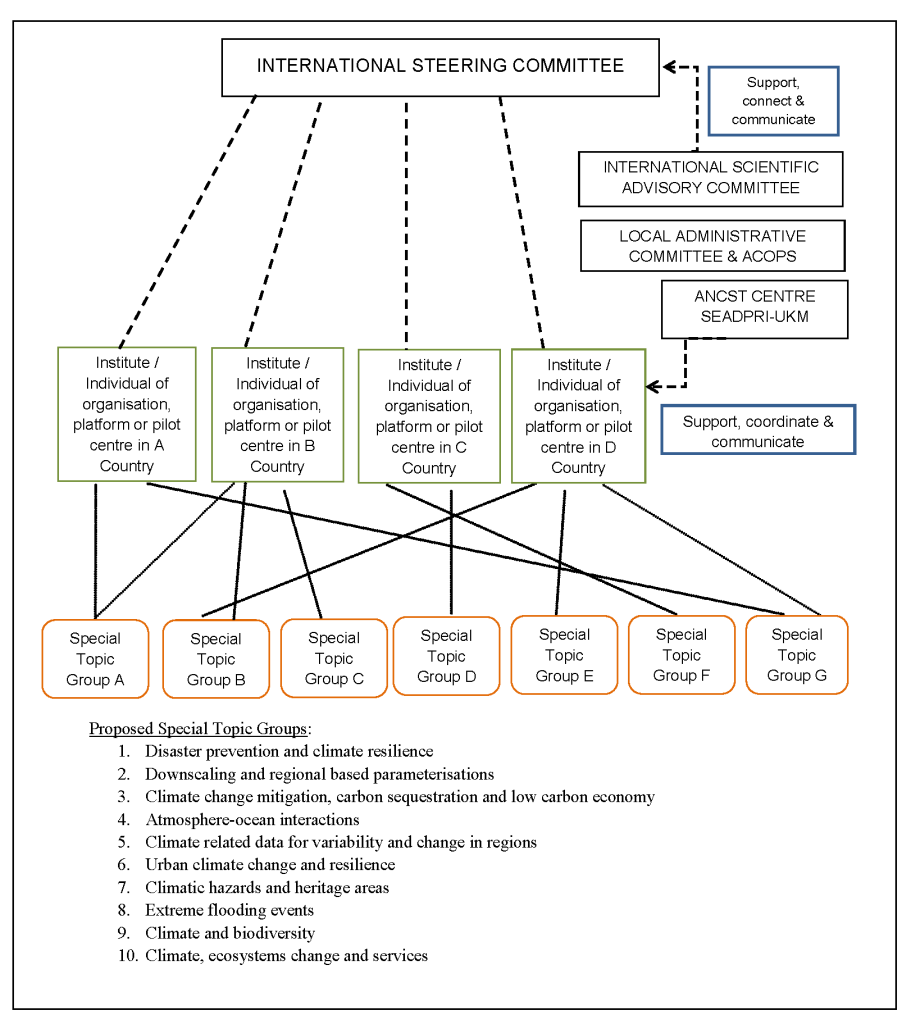Jump To: Introduction | Role of ANCST | ANCST Directors | ANCST Members | Historical Evolution | ANCST Activities | Membership | Address
INTRODUCTION
The Asian Network on Climate Science and Technology (ANCST) provides and facilitates exchange of information to aid development of research coordination projects led by Asian researchers. The scope of ANCST encompasses the broad areas of climate science and technology with particular emphasis on disaster resilience, extreme climate events and urban climate change and related topics.
The setup of ANCST includes an International Scientific Advisory Committee and an International Steering Committee.
ANCST is hosted by Universiti Kebangsaan Malaysia with SEADPRI-UKM serving as the coordination centre, with support from the Cambridge Malaysian Education and Development Trust (CMEDT) in Association with the Malaysian Commonwealth Studies Centre (MCSC) of Trinity College, Cambridge.
There are several networks on climate change and disaster risk reduction operating in Asia. These include the Asian University Network for Environment and Disaster Management (AUEDM), Asia Pacific Adaptation Network (APAN) and Asia Pacific Network for Global Change Research (APN). These networks involve multi-stakeholders primarily policy and decision makers, practitioners, non-government organisations as well as researchers.
ANCST is dedicated solely to enhancing capacity on disaster and climate resilience research, underpinned by science, technology and innovation. ANCST aspires to bring together researchers from various disciplines to a multidisciplinary platform to strengthen their capacity, while simultaneously interacting with other multi-stakeholder networks, intergovernmental bodies and multi-lateral institutions operating in the region.
Greater capacity to innovate and transmit science and technology would enhance disaster and climate resilience in many parts of Asia. This is particularly relevant for Southeast Asia. Institutional planning and coordination for development of multidisciplinary research programmes on disaster and climate resilience is needed at regional and national levels. Establishing strong networking among researchers and academics is critical for building capacity in multidisciplinary and integrated approaches that address disasters related to extreme climate events.

Organisation Structure of ANCST
ROLE OF ANCST
The Asian Network on Climate Science and Technology (ANCST) provides information and develops research coordination projects led by Asian researchers, focusing on particular aspects of climate and disaster resilience specific to Asian conditions and phenomena. There would be strong coordination with existing and planned networks involved in other areas of science and technology.
ANCST is hosted by Universiti Kebangsaan Malaysia with SEADPRI-UKM serving as the coordination centre, with support from the Cambridge Malaysian Education and Development Trust (CMEDT) in Association with the Malaysian Commonwealth Studies Centre (MCSC) of Trinity College, Cambridge.
ANCST DIRECTORS

Emeritus Professor Lord Julian Hunt
Malaysian Commonwealth Studies Centre, University of Cambridge
Advisory Committee on Protection of the Sea (ACOPS)
University College London

Professor Joy Jacqueline Pereira
Southeast Asia Disaster Prevention Research Initiative of UKM (SEADPRI-UKM)

Professor Johnny C. L. Chan
The Guy Carpenter Asia-Pacific Climate Impact Centre
City University of Hong Kong
HISTORICAL EVOLUTION
The Cambridge Malaysian Education and Development Trust (CMEDT) in Association with the Malaysian Commonwealth Studies Centre (MCSC) of Trinity College, Cambridge and the Southeast Asia Disaster Prevention Research Institute of Universiti Kebangsaan Malaysia (SEADPRI-UKM) organised the Workshop on Natural Disasters and Climate Change in Asia from 5 – 7 November 2012 at Hotel Equatorial, Bangi.
The objectives of the Workshop were to bring together researchers, practitioners and policy makers from natural disasters and climate change communities, to review the role of science and technology for managing the risk of natural disasters and climate change especially for vulnerable communities. The ultimate objective was to explore the need for an affiliation of networks and institutions working on issues related to natural disasters and climate change in Asia. About a hundred participants attended the 3-day Workshop, including scientists and practitioners from 31 institutions in 17 countries.
The Special Report on Managing the Risks of Extreme Events and Disasters to Advance Climate Change Adaptation (SREX) of the Intergovernmental Panel on Climate Change (IPCC) served as the basis to bring together researchers, practitioners and policy makers, representing the three historically distinct communities working on disaster issues, climate science and climate adaptation in Asia, to consider future needs for the region. The Workshop was also a follow-up to another regional meeting held in India the year before, which made a strong call for researchers in Asia to interact with each other and advance science and technology pertaining to climate change (Srinivasan and Hunt, 2011).
Key points highlighted at the Workshop include the limited availability of regional data sets on natural disasters and climate change, challenges in accessing scientific data and need to address knowledge gaps and improve communication (Hunt & Pereira, 2012). The Workshop concluded with a strong call for a network to bring together researchers and academics on a routine and continuous basis, which could facilitate institutional planning for development of multi-disciplinary research programmes, particularly at regional and national levels (Pereira, Hunt and Chan, 2013).
References
- Srinivasan, J & Hunt, JCR, 2011. Climate change in Asia, Current Science, vol. 101, no. 10, pp.1269–1270.
- Hunt, JCR & Pereira, JJ, 2012. When access to information may mean the difference between life and death. South China Morning Post, November 26, 2012, A15.
- Pereira, JJ, Hunt, JCR & Chan, JCL 2013. Science and Technology for Disaster Prevention and Climate Resilience in Asia, ASM Science Journal (in press).
ANCST ACTIVITIES
- Maintain a website and enhance communication among Asian scientists
- Circulate ANCST Special Bulletins
- Identification of leaders and scope of Special Topics
- Identification of Country Pilot Institutes
- Develop an Asian Directory of Experts on Climate Science and Technology
- Organise Trainings & Workshops
- Organise ANCST Side Events at key regional meetings
MEMBERSHIP
If you are interested in joining ANCST, download the Membership Form or contact the ANCST Secretariat for further information.
ADDRESS
Asian Network on Climate Science and Technology (ANCST)SEADPRI-UKM, Level 6 Block 1, Keris Mas,
Universiti Kebangsaan Malaysia,
43600 Bangi, Selangor, MALAYSIA
Fax: +603 – 8927 5629
Email: ancst@ancst.org
